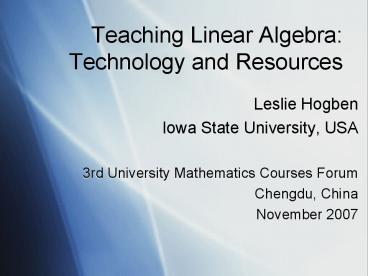Teaching Linear Algebra: Technology and Resources - PowerPoint PPT Presentation
1 / 38
Title:
Teaching Linear Algebra: Technology and Resources
Description:
Teaching Linear Algebra: Technology and Resources Leslie Hogben Iowa State University, USA 3rd University Mathematics Courses Forum Chengdu, China – PowerPoint PPT presentation
Number of Views:289
Avg rating:3.0/5.0
Title: Teaching Linear Algebra: Technology and Resources
1
Teaching Linear AlgebraTechnology and Resources
- Leslie Hogben
- Iowa State University, USA
- 3rd University Mathematics Courses Forum
- Chengdu, China
- November 2007
2
Contents
- Technology
- Effect of LACSG
- Teaching linear algebra research
- Bibliography of linear algebra resources
3
Technology
- Basic matrix computation
- Visualization
- Computation projects
4
Use of technology for basic matrix computations
- Students learn and understand method (for
example, RREF) - Then use technology to solve
- Larger more interesting problems
- Greater variety of problems
5
Technology for basic matrix computations
- Calculators
- MATLAB, Octave
- Mathematica, Maple, SAGE
6
Basic matrix computations
- determinant
- eigenvalues
- eigenvectors
- LU
- QR
- matrix arithmetic
- Inverse
- transpose
- RREF
- row operations
7
Calculators TI 89, 92, Voyage 200
- Matrix operations
- Easy to use
- Hard to print
- Arithmetic
- Symbolic
- Exact
- Decimal
8
Software MATLAB, Octave
- Matrix operations
- Easy to use
- Easy to print
- Arithmetic
- Symbolic ?
- Not exact
- Decimal
9
Octave
- Free open-source download
- http//www.gnu.org/software/octave/octave.html
- Like MATLAB
10
Software Mathematica, Maple, SAGE
- Matrix operations
- Hard to use
- Easy to print
- Arithmetic
- Symbolic
- Exact
- Decimal
11
SAGE
- Free download
- http//www.sagemath.org
- Can also run on-line
- Excellent capabilities
12
TI Calculators
- Entering a matrix
- 1,2,34,5,61,0,1 ? a
- Displays nicely
13
TI Calculators Matrix operations
14
TI Calculators Menus
15
SAGE
- Make matrix space M
- Then enter matrix as
- A M(1,1/2,1, 3,-2,4/3,
4,-3/2,7/3) A - Displays nicely
16
file///Users/hogben/A20Leslie/A20research/07CHI
NA/HogbenUMCF/Linear20Algebra20Examples20(SAGE)
.webarchive
17
Mathematica
- Entering a matrix
- a1,2,3,4,5,6,7,8,9
- Displays nicely only if told to
18
Mathematica Matrix operations
19
Mathematica Menus exist but are harder to use
than typing
20
Visualization SoftwareRichard Vargas Gershini
http//etna.mcs.kent.edu/vol.8.1999/pp15-20.dir/ge
rshini.html
file///Users/hogben/A20Leslie/A20research/07CHI
NA/HogbenUCMF/gershini.webarchive
21
Computation projects
- A project is
- A multi-part activity
- Involves technology
- Usually involves an application
22
Sample Projects
- Markov chains
- Electric circuits (current/voltage only)
- Gershgorin circles
- Computer graphics
23
Effect of LACSG
- Lead to ongoing discussion of teaching linear
algebra - Some criticism from math educators, but had very
little effect - Some recommendations widely adopted
- Others (omissions from core) ignored
24
Why was LACSG influential?
- LACSG recommendations made sense to faculty
teaching linear algebra - Many universities and authors were already
revising their linear algebra courses and texts
in a similar manner.
25
Some LACSG recommendations were already happening
- In 1979 I taught linear algebra from a
LACSG-style text (Anton) - Matrix oriented, emphasized Rn
- Applications in a supplement
- Not much technology
- No use of partitioned matrices
26
What LACSG advice adopted?
- Matrix oriented
- Emphasis on Rn
- All core topics
- Applications
- Use of technology
27
What was not adopted?
- Defer abstract vector spaces and linear
transformations to 2nd course - 2nd course at small colleges
28
LACSG core
- Matrix oriented
- Emphasizes Rn
- LACSG core abstract vector spaces linear
transformations - Widely adopted
29
LACSGs partitioned matrices
30
Partitioned matrices in texts
- Partitioned matrix perspective partially evident
in Lay, Leon, Strang, - Fully in the graduate text by Zhang
31
Iowa State University
- 21,000 undergraduates and 5,000 graduate students
- 140 undergraduate mathematics majors (many will
become high school teachers) - 50 PhD and 15-20 MS students in math and applied
math
32
Linear Algebra at ISU
- In mid-1980s ISU faculty evaluated the first
undergraduate linear algebra course (math 307) - Course was split into two
- Both matrix oriented and use technology for basic
computation
33
Linear Algebra at ISU
- Math 307 is a LACSG first course aimed at
students in other fields - Math 317 is a first linear algebra course for
math majors and emphasizes proof writing but is
matrix oriented and uses technology - Math 471 is numerical linear algebra
34
Teaching Linear Algebra Research
- US-NSF Research Experiences for Undergraduates
(REU) program - ISU combinatorial matrix theory research group
35
US-NSF REU
- US has a problem persuading undergraduates to
enter graduate school - REUs show students what doing math is like and
create enthusiasm for math - More REU students go to graduate school
36
ISU Combinatorial Matrix Theory Research Group
- Summer REU for undergraduates
- Academic year early research course for first
year graduate students
37
Bibliography of Linear Algebra Resources
- Technology bibliography
- LACSG bibliography
- Undergraduate research bibliography
38
Thank you!































